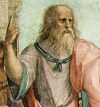- Commentaries on Plato
-

Part of a series on Plato Early life · Works · Platonism
Epistemology · Idealism / Realism
Theory of Forms
Form of the Good
Third man argument
Euthyphro dilemma · Five regimes
Philosopher kingAllegories and metaphors Ring of Gyges · The cave
The divided line · The sun
Ship of state · Myth of Er
The chariotRelated articles The Academy in Athens
Socratic problem
Commentaries on Plato
Middle Platonism · Neoplatonism
Neoplatonism and ChristianityCommentaries on Plato refers to the great mass of literature produced, especially in the ancient and medieval world, to explain and clarify the works of Plato. Many Platonist philosophers in the centuries following Plato sought to clarify and summarise his thoughts, but it was during the Roman era, that the Neoplatonists, in particular, wrote many commentaries on individual dialogues of Plato, many of which survive to the present day.
Contents
Greek commentators
Many of the scholars in the Platonic Academy sought to clarify and explain Plato's ideas. Already in the 3rd century BC, we hear of a commentary to Plato's Timaeus being written by Crantor of Soli;[1] and in the 1st century AD a commentary on Plato's Republic was written by Onasander.[2] By the 2nd century the Middle Platonists were producing paraphrases and summaries of Plato's thought. Thus we have Albinus, who wrote an introduction to Plato's works, and Alcinous and Apuleius who both wrote manuals of Platonism.[3] From the physician Galen we have fragments of a commentary on the Timaeus.[4] Already though the influence of Aristotle was being felt on the popular Platonism of the day, and we have the figure of Atticus (c. 175) who opposed the eclecticism which had invaded the school and contested the theories of Aristotle as an aberration from Plato.[3]
The Neoplatonists though sought to exhibit the philosophical ideas of Plato and Aristotle as a unity. Porphyry (3rd century) attempted in a special work to show the agreement of Aristotelian and Platonist philosophy and wrote a number of commentaries on Plato, Aristotle, and Theophrastus.[5] Additional commentaries on Plato were written by Dexippus, Plutarch of Athens, and Syrianus. A partial translation and commentary in Latin of Plato's Timaeus by Calcidius was significant for being the only substantial work of Plato known to scholars in the Latin west for approximately 800 years.[6] The best commentaries date from this era; most of the works of Proclus are commentaries on single dialogues of Plato and similar subjects.[7] The commentaries on Plato were either given in lectures or written; and many have come down to us. Later Neoplatonist commentators on Plato whose works partially survive include Damascius and Olympiodorus.
Byzantine commentaries
In the Byzantine era, Aristotle was read more often than Plato, because of the importance placed on Aristotle's logical treatises.[8] A key figure was Arethas, the 10th century Archbishop of Caesarea, who concerned himself with the preservation of the manuscripts of Plato and other ancient writers, and wrote scholia to the texts of Plato in his own hand.[9] By the 11th century enthusiastic admirers of Platonism could be found in figures such as Michael Psellos and John Italus.[10] The only surviving commentary from the late empire is a commentary on the Parmenides by George Pachymeres.[10]
Islamic commentaries
Compared to Aristotle, Plato figured far less prominently in Islamic philosophy. He was seen more as a symbol and as an inspiration rather than a source of practical philosophy.[11] Islamic Platonism, when it came, was a development within Aristotelian philosophy.[12] Far fewer of his works were known to the Islamic world than those of Aristotle. It seems that only the Laws, the Sophist, the Timaeus, and the Republic, were available in Arabic translation.[11] Averroes, who wrote many commentaries on Aristotle, was probably motivated to write his one Platonic commentary, on the Republic, only because he could not find a copy of Aristotle's Politics.[13]
References
- ^ Zeller (1895), page 172
- ^ Dihle & Malzahn 1994, page 153
- ^ a b Zeller (1895), page 309
- ^ Dickey 2007, page 49
- ^ Zeller (1895), page 323
- ^ Grant 2004, pages 93-4
- ^ Hegel (1896), page 403
- ^ Kennedy (1999), page 190
- ^ Dickey 2007, page 46
- ^ a b Angelov (2007), pages 344-5
- ^ a b Platonism in Islamic Philosophy, (Routledge Encyclopedia of Philosophy, 1998)
- ^ Benson (2006), page 445
- ^ Black, page 119
Sources
- Georg Wilhelm Friedrich Hegel, (1896), Lectures on the History of Philosophy, Part One. Greek Philosophy.
- Eduard Zeller, (1895), Outlines of the History of Greek Philosophy.
- Dimiter Angelov, (2007), Imperial Ideology and Political Thought in Byzantium, 1204-1330. Cambridge University Press
- Hugh H. Benson, (2006), A Companion to Plato. Blackwell
- Antony Black, (2001), The History of Islamic Political Thought. Routledge
- Eleanor Dickey, Ancient Greek Scholarship. Oxford University Press
- Albrecht Dihle, Manfred Malzahn, (1994), Greek and Latin Literature of the Roman Empire: From Augustus to Justinian. Routledge
- Edward Grant, (2004), Science and Religion, 400 B.C. to A.D. 1550, pages 93-4. Greenwood Publishing Group
- George Alexander Kennedy, (1999), Classical Rhetoric & Its Christian & Secular Tradition from Ancient to Modern Times. UNC Press
Further reading
- Roy K. Gibson, Christina Shuttleworth Kraus, (editors), (2002), The Classical Commentary: Histories, Practices, Theory. BRILL
- Richard Sorabji, (2005), The Philosophy of the Commentators 200-600 AD. A Sourcebook. Cornell University Press
See also
Categories:
Wikimedia Foundation. 2010.
